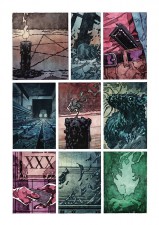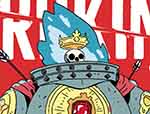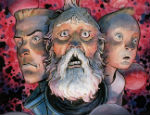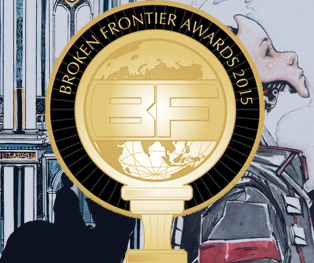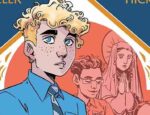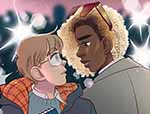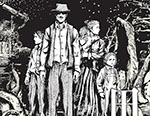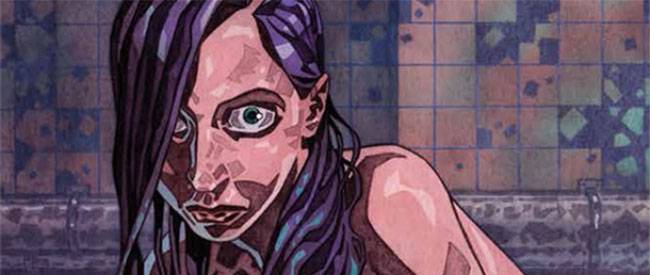
Another week, another amnesia mystery. However, the high-level craft of Greg Rucka and Toni Fejzula adds a bit of gloss to a routine set-up.
It seems that every week brings a solicitation blurb promising a character waking up with no idea who they are, where they are or how to get out of their predicament. For a bonus point, they can also startle themselves by tapping into an unsuspected proficiency for violence.
In Veil, a five-parter from Dark Horse, the amnesiac is another female protagonist from the pen of writer Greg Rucka (Lazarus). Fortunately, his spare script and the atmospheric input of artist Toni Fejzula demonstrate that the stylistic possibilities of comics can freshen up even the most familiar tropes.
The book demands the reader’s attention from the very first page, when a slideshow of half-seen images flickers in front of us, setting a distinct tone for the story: a gun tucked in a waistband; black candles and a pentagram; a handover of money; and rats. Lots of rats.
The rats are at home in a seemingly abandoned subway station, where a young woman wakes up suddenly on the platform. Sure, we’ve all done that, but there are two things of note here: she’s as naked as the day she was born, and she seems to be a tabula rasa, with no sense of who she is, how she got there, or even how to use language properly.
The mystery deepens as she makes short work of the station’s locked iron gate, and before long she finds herself in a busy city street – in very much the wrong part of town.
The sudden appearance of a naked young woman instantly brings out the worst in the neighbourhood’s grisly denizens – but also the best, as a young man called Dante extricates her from a nasty situation, gives her his coat and brings her to the comparative safety of his apartment. Along the way she gives him what seems to be her name: Veil.
However, she isn’t out of the woods yet. Tension and an air of menace build up throughout the issue, but when the storm breaks, it does so in a way you wouldn’t necessarily have expected, pushing the intrigue and mystery to the next level.
But that’s only half the story. What makes Veil distinctive is the captivating artwork of Toni Fejzula, who seems to be something of an international man of mystery, given my almost total lack of success in finding out much about him.

In light of what happens in this first issue, Veil has to tread a very delicate line between strong subjective storytelling and joining in the exploitative ‘male gaze’ of most of its less-than-pleasant characters (and, let’s face it, a lot of what we see on the comic shelves each week).
Maybe it’s not really my call to say whether it succeeds or not. However, Rucka’s careful scripting and Fejzula’s confident lines give Veil a strength that belies the apparent vulnerability of her situation. Suffice to say that by the end of #1, it’s clear that she’s going to be nobody’s victim.
Apart from the strength of his storytelling, Fejzula’s highly stylised colouring choices also give the book a unique look. He tosses naturalism aside for a saturated, almost psychedelic look, giving the pages an intense and unsettling air.
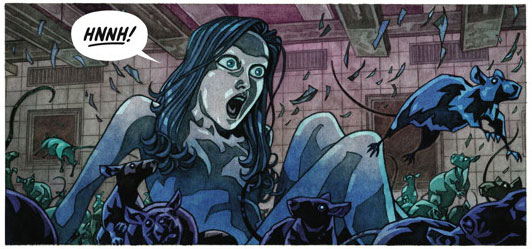
This is a very urban, nocturnal book that clearly plays to its creators’ strengths, and I was pleased to discover that it was a five-parter rather than an ongoing title. With its female protagonist, air of mystery and subway station opening, Veil initially evoked Mind the Gap (Image) – a series that I fell out of love with when its central question threatened to go unanswered for too long.
Maybe it’s the aging punk in me that likes the heady slam of a two-and-a-half-minute single, but a lot of the comics that have excited me of late have been mini-series (or ongoings like Matt Kindt’s Mind MGMT, which condense their narratives into clearly defined arcs). Especially in a story like Veil, with a pivotal mystery, it seems important to feel a sense of urgency and the promise of a fulfilling conclusion.
As mentioned above, the beauty of comics – as demonstrated by Matt Madden in his essential book 99 Ways to Tell A Story – is that the near-infinite range of stylistic choices available to creators can give a shot of narrative adrenaline to stories we may think we’ve heard before.
Rucka and Fejzula don’t quite hit the mainline in the first issue of Veil, but they do enough to warrant a second look.
Greg Rucka (W), Toni Fejzula (A) • Dark Horse Comics, $3.50, March 5, 2014





